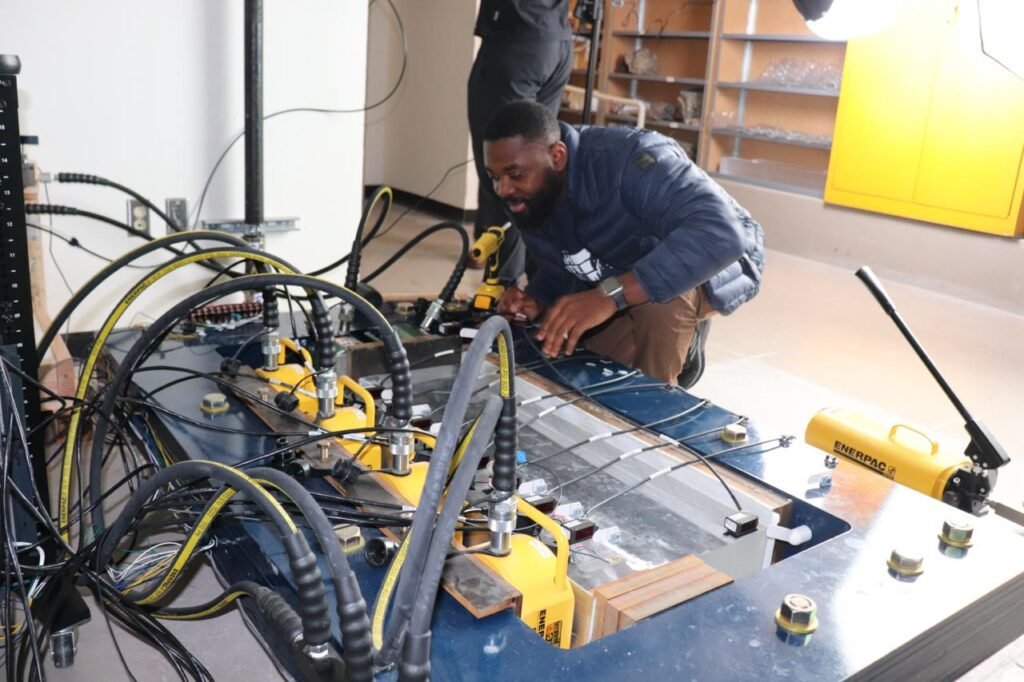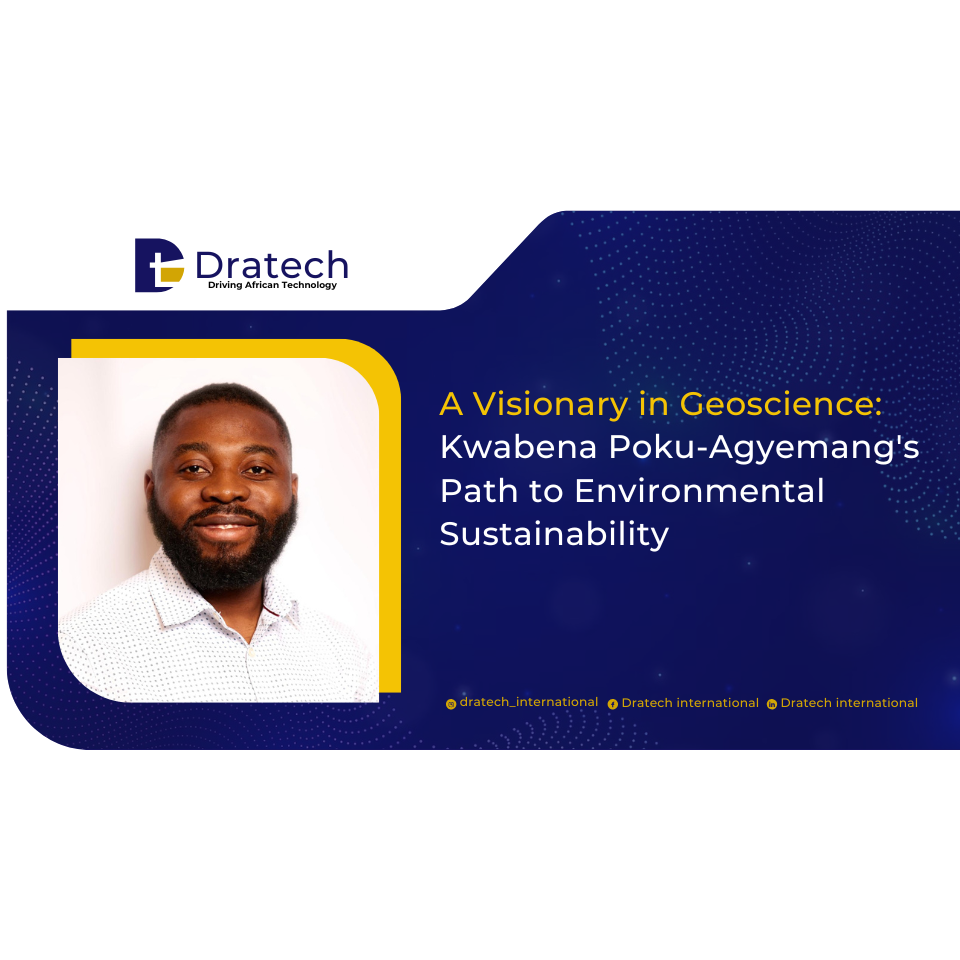Kwabena Poku-Agyemang is an emerging leader in geoscience whose academic and professional journey exemplifies dedication to advancing scientific knowledge and making a tangible impact on society. Currently pursuing a Ph.D. in Geoscience at Utah State University, Kwabena’s research focuses on understanding the Earth’s dynamic processes, including rock deformation, earthquake monitoring, and forecasting. His work has far-reaching implications, from improving earthquake forecasting to ensuring groundwater accessibility in underserved communities.
Kwabena Academic Background
Kwabena’s academic journey began in Ghana, where he earned a Bachelor of Science in Physics (Geophysics) at Kwame Nkrumah University of Science and Technology. His undergraduate research involved applying electrical resistivity techniques to locate groundwater in the Appiadu Community, a project that addressed critical water needs by identifying areas with high groundwater potential. This practical application of geophysics to solve real-world problems set the stage for his future work.
He later advanced his studies at Louisiana State University, where he completed a Master of Science in Geology and Geophysics with a perfect 4.0 GPA. His master’s research explored how factors like porosity, grain size, and sorting affect the elastic properties of sediments using micro-X-ray tomography. He applied the Hertz-Mindlin theory to predict seismic velocities, bridging theoretical geophysics with practical applications that enhance subsurface modeling.
Kwabena Research Contributions
Kwabena’s research contributions are substantial and diverse. During his master’s studies, he explored how factors like porosity, grain size and sorting with sediments affect the elastic properties using micro-X-ray tomography and applied the Hertz-Mindlin theory to predict seismic velocities.
This innovative work bridges theoretical geophysics with practical applications, enhancing the ability to model and interpret subsurface conditions.
Kwabena’s professional accomplishments are complemented by his ability to secure research grants like the prestigious American Association for Petroleum Geologists (AAPG) grant, which partially supported his master’s research.
Now, as a doctoral researcher, he studies rock deformation and uses advanced seismic techniques to predict and monitor earthquakes. This research involves designing experiments, operating biaxial machines, analyzing the mechanical and ultrasonic properties of rocks under stress, and utilizing machine learning to forecast earthquakes.
By improving our understanding of fault mechanics and stress accumulation, Kwabena’s work could significantly enhance our ability to predict earthquakes, reducing risks to life and infrastructure in vulnerable areas.
Kwabena Professional Experience and Achievements

Photo Credit: Mary-Ann Muffoletto
Beyond the laboratory, Kwabena has demonstrated a strong commitment to applying his skills for the greater good. He has volunteered for projects like installing seismic nodes in Southern Louisiana as part of a microseismicity research initiative, a National Science Foundation project, contributing to efforts that improve our understanding of local seismic activity.
He also mentors undergraduate students, training them in geophysical software and techniques, ensuring that the next generation of geophysicists is equipped with the knowledge and tools to address future challenges.
Kwabena’s research is not only advancing scientific understanding but also delivering tangible societal benefits. His work on earthquake forecasting has the potential to save lives by providing early warnings and improving disaster preparedness.
Similarly, his expertise in groundwater exploration addresses pressing water resource challenges, particularly in regions with limited access to clean and reliable water supplies. His efforts in mentoring students and engaging in scientific outreach amplify these benefits, as his influence inspires others to contribute to solving critical environmental and societal problems.
Kwabena’s current project on rock deformation and earthquake monitoring, funded by the National Science Foundation and Utah State University, reflects his capacity to conduct impactful research initiatives. Additionally, his technical expertise spans a wide array of geophysical tools, statistical programming, machine learning, and data visualization, making him a versatile and effective researcher.
Leadership and Community Engagement
Kwabena has also demonstrated leadership in the geophysical community through his active participation in organizations such as the Society of Exploration Geophysicists (SEG), the Geological Society of America, Society of Petroleum Engineers, American Geophysical Union, European Association of Geoscientists and Engineers, and the Seismological Society of America.
As President of the SEG LSU Student Chapter, he organized events that fostered collaboration and knowledge-sharing among students and professionals. His commitment to service is evident in his role as a poster judge at graduate research conferences and his voluntary work in training students on geophysical software.
Recognition and Awards
Kwabena Poku-Agyemang’s recognition within the geoscience community is a evident to his significant contributions and unwavering commitment to advancing environmental sustainability and scientific knowledge. His accolades reflect not only his academic excellence but also his dedication to applying geoscientific principles for the benefit of society.
Dratech Environmental Sustainability Award 2024
In 2024, Kwabena was honored with the Dratech Environmental Sustainability Award, a prestigious recognition given to individuals who demonstrate exceptional commitment to sustainable practices and innovative research that benefits society. The award highlights his groundbreaking work in earthquake monitoring and groundwater exploration, which addresses critical environmental challenges. The panel of judges selected him based on several criteria:
- Innovative Research: His studies on rock deformation and the use of advanced seismic techniques for earthquake prediction were pivotal in earning this recognition.
- Community Impact: Kwabena’s research not only advances scientific understanding but also delivers tangible benefits to underserved communities, particularly in ensuring access to clean groundwater.
- Leadership and Mentorship: His active involvement in mentoring students and leading initiatives within professional organizations showcases his dedication to fostering future generations of scientists.
Other Awards and Honors
In addition to the Dratech Award, Kwabena has received several other accolades that highlight his contributions to geoscience:
- Ike Crumbly Minorities Energy Grant Award (2024): This grant recognizes his efforts in promoting diversity within the energy sector through his research initiatives.
- 2nd Place Best Oral Presentation at the 43rd National Association of Black Geoscientists Award (2024): This honor reflects his ability to effectively communicate complex scientific concepts to diverse audiences.
Kwabena Poku-Agyemang’s recognition within the geoscience community is a reflection of his hard work, innovative spirit, and dedication to making a positive impact on society. These Awards further affirms his role as an emerging leader whose research not only furthers scientific understanding but also addresses critical societal challenges.
As he continues on his journey, Kwabena’s story serves as an inspiration for aspiring scientists everywhere, particularly those from underrepresented backgrounds, demonstrating that with passion and perseverance, one can make significant contributions that resonate far beyond their immediate environment.
Publications and Presentations
Kwabena Poku-Agyemang’s publication record reflects his commitment to advancing geoscience through rigorous research and active engagement with the scientific community. His contributions span various topics within geophysics, emphasizing practical applications that address critical societal challenges. Thus; he has authored and co-authored several research papers and articles that contribute to the understanding of geophysical processes and their implications for environmental sustainability. His work often focuses on innovative methodologies and technologies that enhance data collection, analysis, and interpretation in geoscience.
Key Publications
- Groundwork: Volunteer-Led Short-Term Geophysical Field Experiment—Lessons for Inviting Broader Participation, Building Public Trust, and Communicating Science. This publication discusses the importance of community engagement in geophysical research. It emphasizes how volunteer-led initiatives can foster broader participation in scientific endeavors, build public trust, and effectively communicate complex scientific concepts to diverse audiences. The insights gained from this study can inform future outreach efforts in geoscience, making science more accessible and relatable to the public.
- Thesis: Elastic Properties of Sediments Using Micro-X-ray Tomography
Kwabena’s master’s thesis explored how physical properties of sediments—such as porosity, grain size, and sorting—affect their elastic characteristics. By employing micro-X-ray tomography, he provided valuable insights into the subsurface conditions that are critical for effective resource management and environmental assessment.
Conference Presentations
Kwabena has actively participated in numerous conferences, presenting his research findings to peers and experts in the field. Notable presentations include:
- 43rd National Association of Black Geoscientists Annual Technical Meeting (2024)
Kwabena presented his research on earthquake monitoring techniques, sharing insights on how these methods can enhance predictive capabilities in seismology. - Gordon Research Rock Deformation Conference (2024)
At this prestigious conference, he discussed his experimental approaches to studying rock mechanics under stress conditions, contributing to the understanding of fault behavior and seismic activity. - Pinkie Gordon Lane Graduate Research Conference
His presentations at this conference have focused on bridging theoretical concepts with practical applications in geophysics, showcasing his ability to communicate complex ideas effectively.
Kwabena’s publications not only advance academic discourse but also serve as a bridge between scientific research and community needs. His emphasis on practical applications—such as improving groundwater accessibility and enhancing earthquake preparedness—demonstrates a commitment to using science as a tool for societal benefit.
By engaging with both the academic community and the public through his research and outreach efforts, Kwabena Poku-Agyemang exemplifies the role of a modern scientist who understands the importance of communicating science effectively. His work inspires future generations of geoscientists to pursue research that is not only innovative but also deeply connected to the pressing challenges faced by communities around the world.
Future Aspirations
Looking ahead, Kwabena aims to continue his impactful research while expanding outreach efforts to inspire young scientists from underserved communities. He envisions leveraging his expertise in geoscience not only to advance academic knowledge but also to address pressing environmental issues globally.
Kwabena Poku-Agyemang is not just a scientist; he is a dedicated mentor, leader, and visionary whose work positively impacts society. His contributions to earthquake monitoring, groundwater exploration, and geophysical research can improve lives and mitigate risks in communities worldwide. Through his volunteer efforts and commitment to mentoring, he continues to inspire others to pursue science as a tool for solving real-world challenges.
His story is evidence to the power of perseverance, innovation, and service—qualities that will undoubtedly lead him toward even greater contributions to geoscience and society in the years to come.
Conclusion
Kwabena Poku-Agyemang is not just a scientist; he is a dedicated mentor, leader, and visionary whose work positively impacts society. His contributions to earthquake monitoring, groundwater exploration, and geophysical research can improve lives and mitigate risks in communities worldwide.
Through his volunteer efforts and commitment to mentoring, he continues to inspire others to pursue science as a tool for solving real-world challenges. Kwabena’s story is a testament to the power of perseverance, innovation, and service, and his journey promises even greater contributions to geoscience and society in the years to come.





